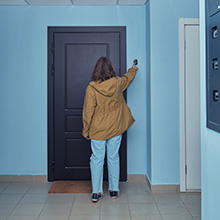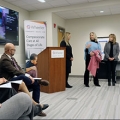Healing at Home: MST and MDFT Programs at Wheeler Health

Summary
Wheeler’s in-home services provide intensive, hands-on support through evidence-based models like Multisystemic Therapy (MST) and Multidimensional Family Therapy (MDFT), helping families overcome challenges such as substance use disorder, behavioral difficulties, and trauma. These programs foster resilience and healing by empowering caregivers, addressing environmental factors, and offering wraparound care that integrates schools, community partners, and other essential services.
Every day, across the state, dozens of Wheeler clinicians step out of their cars, ring a doorbell, and change lives in the most intimate setting, a family’s home.
Through that therapeutic care, says Deb Batsie-Hernandez, LMFT, senior director of community in-home services, families often discover they already have the tools needed to heal and grow.
“Our families overcome so much,” she says. “Parents love their kids, and we sometimes help them find that love. Our families are resilient, through the worst.”
The youth served may have long histories of substance use, behavioral health concerns, and more, often with involvement in the judicial system, multigenerational trauma, long-standing truancy, or poverty. The stories from Wheeler’s staff flow easily and meaningfully:
One family whose house burned down called their clinician after calling 911, and the staff stayed with them throughout the night, helping the family find shelter, get to school, and heal.
When their apartment building was infested with rodents, another family relied on their Wheeler clinician to help them advocate for change and safety.
“Once you do in-home work, I think you can handle anything as a clinician,” says Victoria Prestileo, LCSW, director of community in-home services. “You often have no idea what to expect on the other side of that door when you enter. What I want people to know and value is that our staff take on so much every day. They are incredibly dedicated, navigating complex situations every day as a team to ensure safety and well-being for themselves and the families we serve. While we’re not first responders, we are focused on creating a network of care with schools, community partners, and everyone you can imagine to keep children safe and supported in their communities."
"We work with families that have often had negative experiences with different systems involved in their lives,” adds Chanel Hildebrand, LCSW, director of community in-home services. “It is our job to help them navigate those systems and to support others in seeing what makes the family shine, rather than only where they struggle. We are often the holders of hope.”
Two in-home models commonly employed at Wheeler, Multisystemic Therapy (MST) and Multidimensional Family Therapy (MDFT), serve up to 230 families at a time and are far more similar than different.
- Both models are family-centered and evidence-based. Wheeler is a nationally recognized leader in evidence-based model implementation.
- Both models focus on adolescents as the client, though ages do vary: MDFT can be used for youth ages nine to eighteen and a half years old, while MST is for youth ages twelve to eighteen. Wheeler has also been a key partner in working with the MST and MDFT model developers to expand the model to other populations and treatment needs, offering a number of different programs that address specific concerns like opioid use disorder, problem sexual behavior, intimate partner violence, and more.
- Both last five to six months and aim for the goal of a discharge to a level of care like outpatient services (such as offered at a Wheeler Family Health & Wellness Center).
- Both are available 24/7/365.
- Both are used for many of the same behaviors.
- Both are funded by the Connecticut Department of Children and Families, which provides the bulk of referrals.
- Both also take community referrals.
- Both accept families without regard for their ability to pay, or without insurance.
“In both models, we want to build up a parent’s responsibility and confidence,” says Batsie-Hernandez. “We help caregivers recognize what their strengths are.”
“We aren’t the police. We aren’t the state. We’re not punitive. We’re there to be partners,” Prestileo adds. “We let parents know they know their child better than anyone. We like to say that they are their own medicine…they are how their children will get better. Our philosophy is that the child is not the problem. All of the domains around that child are equally important: their family, their peers, their school, their community.”
“We look at the whole picture, and most importantly, we let them know that they are seen,” Batsie-Hernandez adds. “It takes one person to help build their resilience...to give a family hope.”
RELATED LINKS
- Multidimensional Family Therapy (https://www.mdft.org/)
- Proven effective in over 25 years of research and over 20 years of implementation efforts in the United States and
Europe
- Proven effective in over 25 years of research and over 20 years of implementation efforts in the United States and
- Multisystemic Therapy (https://www.mstservices.com/)
- Proven results from 90+ studies
- More than 200,000 families, in 15 countries and 34 US states, have been positively affected by MST.
- Workforce Development for Evidence-Based Practices at Wheeler




